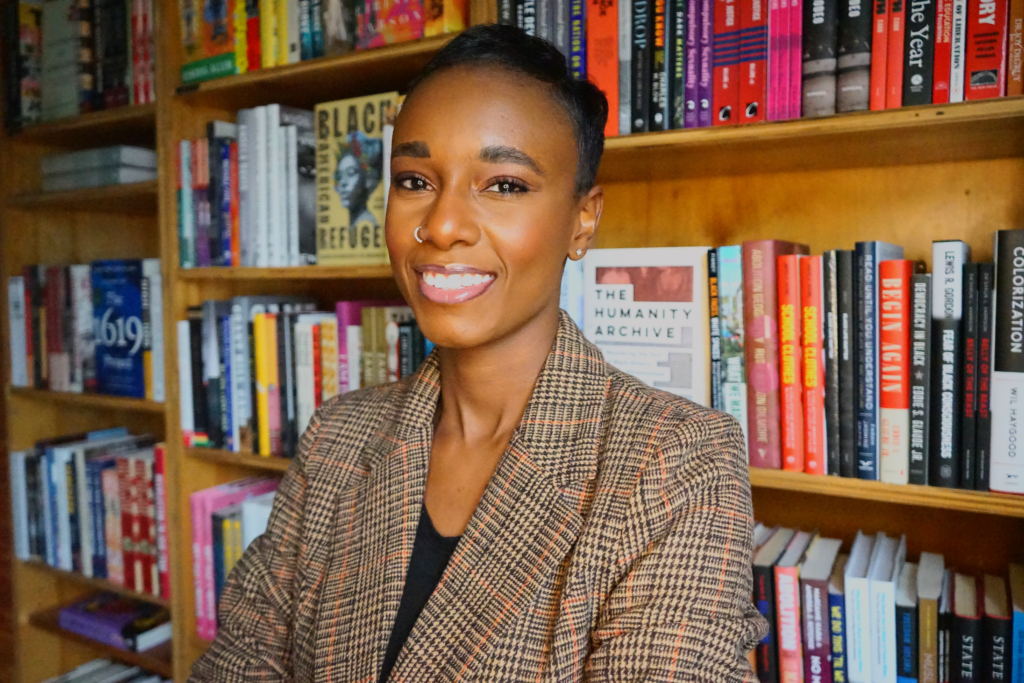PRAIRIE VIEW, Texas (April 25, 2024) – Prairie View A&M University Assistant Professor of Sociology Dr. Asheli Atkins wants to help marginalized entrepreneurs overcome barriers.
This has been her driving force her entire career, and now, she joins the “One Million Black Women Research Partnership” to further empower Black women entrepreneurs.
Atkins was accepted into the second cohort of Goldman Sachs and the Urban Institute’s joint venture, which launched in 2022. The first year focused on developing new products to address persistent racial disparities in wealth and earnings. The second year aims to build a community of researchers learning about and addressing the racial wealth gap Black women face.
“My desire to study Black entrepreneurs is not a decision made solely due to my identity as a Black woman, entrepreneur and scholar,” said Dr. Atkins, who has an MBA in business administration from Texas Woman’s University and a Ph.D. in sociology from Texas A&M University. “In my MBA program, the absence of attention on social categories such as race, class and gender created a false assumption that business ownership is a level playing field.”
The $10 billion Goldman Sachs initiative seeks to address that. With direct capital investment and $100 million in philanthropic support over the next ten years, the goal is to bridge the gaps Black women face in areas of life like education, health, housing and financial access.
“The past two years have confirmed a key insight of our research: By investing in businesses that help Black women advance, we can build a stronger economy for everyone,” David Solomon, Chairman and CEO of Goldman Sachs, said in a press release introducing the initiative. “Our firm has a long history of supporting economic empowerment, and we’re proud that One Million Black Women is already making a difference.
Tips for Overcoming Barriers
Atkins, who is passionate about helping marginalized businesses succeed, also serves as the executive director of Houston’s Greater Northside Chamber of Commerce. For marginalized entrepreneurs, Atkins offers some research-based tips on ways to overcome barriers: diversifying business networks, seeking alternative funding sources, and not conforming to the norms of society.
“Find business-related organizations where no one looks like you, and you don’t know anyone – this is how you gain access to new and different business resources,” she said. “Additionally, don’t copy industry norms…often [they] were not developed by or for marginalized business owners, so they may harm your business more than they help.” She added, “Lending discrimination from banks continues to be a prevalent issue that prevents businesses from gaining access to capital,” she points out there are other options available, such as grants, investors, pitch competitions and lending programs like LiftFund.
Also, for budding entrepreneurs tempted to “Google” how to start a business, she advises seeking expert advice. “When it comes to legal, financial, human resources and even marketing, it’s often best to pay the experts,” Atkins said. “Yes, Google and YouTube will show you how to do certain things, but filing for an LLC, doing business taxes, or hiring are areas in which you can’t afford to make mistakes. You can either pay the experts upfront or pay them to fix your mistakes.”
As part of this research partnership initiative, Atkins will create an infographic of research-based policy recommendations for corporations and, more importantly, work on an academic article examining how Black women leave corporate fields to become entrepreneurs to control their pay and wealth.
“Findings from this article will not only highlight entrepreneurship as a strategy for wealth fairness among Black women, but it will provide current and emerging Black women entrepreneurs with the strategies they need to develop and maintain businesses,” Atkins said.
Uncovering the Keys to Success
In a recent review, “Exit Plan: How Racialized and Gendered Organizations Lead Black Women to Entrepreneurship,” Atkins delves into the career trajectories of Black women and the workplaces that shape them. Based on “literature and interviews with 33 Black women entrepreneurs,” the review examines “Black women’s exit from the workplace and their decision to become entrepreneurs and their strategies for navigating racism and sexism as business owners.”
Based on her findings, she calls for “a system of reporting that provides transparency, accountability and protection to support Black women and protect them from discrimination in the workplace.” Specifically, “an annual reporting system for organizations with employees in the U.S. that helps enforce the implementation of policies” and reports that are “accessible to the public, especially as it relates to equal pay, resolution of workplace discrimination, diversity in upper-level positions, and diversity in recruitment and retention.”
The Goldman Sachs initiative aims to fund such new research products and build on existing research to develop the evidence base, elevate scholars of color, and act as a catalyst for future investments and funding to address the wealth gap.
“With the historical institutional discrimination and racism that marginalized businesses face and continue to face, I want to draw attention to the strategies that they create, which allows them to grow at higher rates than non-marginalized businesses,” Atkins said. For example, she says, Black women are the fastest-growing entrepreneurial group in the U.S., despite many barriers such as sexism, racism and discrimination.
Atkins wants to uncover their key to success: “My research focuses on assisting marginalized small business owners — with specific attention to Black entrepreneurs — in the development of sustainable businesses through the development of a multidisciplinary framework that examines the entrepreneurial strategies utilized to navigate barriers in the market.”
In addition to various lectures, media placements, and conference presentations, her publications include “Is Gentrification a Detriment to Predominately Black and Latinx Communities: Affirmative” and “In Contemporary Debates in Social Justice: An Interdisciplinary Approach.”
This semester at PVAMU, she has been teaching “Sociology of Entrepreneurship,” exploring key theories and concepts such as middleman minority and isomorphism to understand how race, class and gender impact one’s entrepreneurship endeavor.
By Christine Won
-PVAMU-

